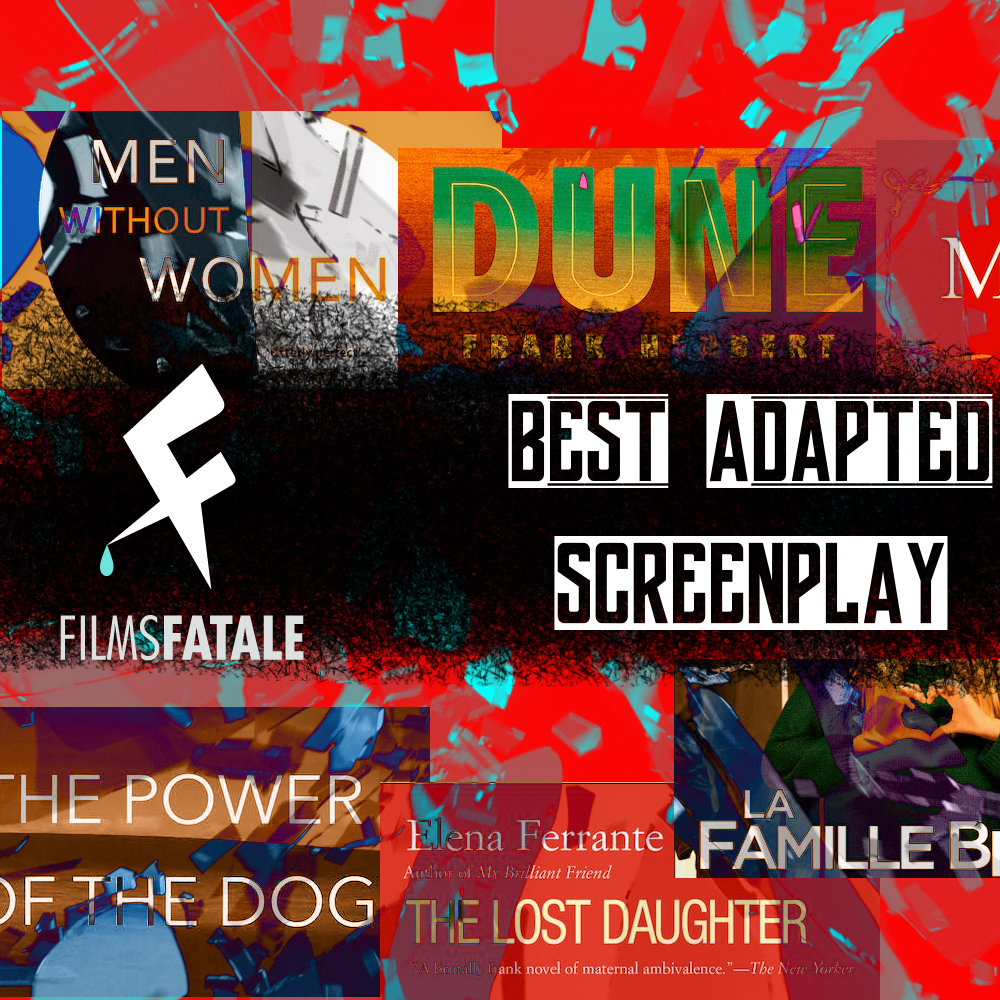Best Adapted Screenplay: Ranking Every Oscar Nominee
Written by Andreas Babiolakis
When discussing original screenplays, it’s easy to get into the crux of the creativity of a storyteller. However, I feel like people misunderstand the capabilities of adapted screenplays. They’re more than just a retelling of another story: they’re the reimagining of the words of another in wholly invigorating ways. A category like this at the Academy Awards can honour more than how great a screenplay is because the deviations, retooling, and reinvention of former source materials can be cherished as well. Which storytellers went the distance with their own visions of previous stories? Unlike the Original category this year, I think the five Adapted Screenplay nominees are much stronger overall. Here are your nominees.
Biggest Snub: The Tragedy of Macbeth-Screenplay by Joel Coen
While a fairly direct interpretation of William Shakespeare’s Macbeth, Joel Coen’s version is told so darkly and eerily, with the highlighting of the oddities of the human condition to match his signature style (despite there being much less humour than your typical Coen brothers production). While I think there are some other snubs here (like West Side Story, whose absence here may cost it the Best Picture win), I’m also sad that The Tragedy of Macbeth was barely represented at this year’s Oscars at all, especially when it is arguably one of the strongest Shakespeare adaptations I’ve ever seen.
5. CODA-Screenplay by Siân Heder
CODA has some touching moments and the kinds of heartfelt lines that you’d expect from a film of this nature, but I think the real reason to champion the film in such a category is because of how much it improves upon its French counterpart La Famille Bélier (enough to warrant existing). CODA’s screenplay is the weakest here, but it’s sweet and direct enough that it will likely affect many that watch it.
4. The Lost Daughter-Written by Maggie Gyllenhaal
Maggie Gyllenhaal’s side-by-side juxtapositions of the past and present of character Leda are fascinating to witness, and the slowly revealed twists and turns of The Lost Daughter make it a must-have nominee in this category. It’s evident that Gyllenhaal is extremely wise with how information can be distributed, and that showcases her strengths as a director (which she wasn’t acknowledged for this year) and as a writer. The Lost Daughter really allows you to sink in each and every moment, which is something Gyllenhaal extrapolated from the original story: it’s as if you are viewing a novel via a cinematic lens (especially when you gaze upon beaches, stores, and other locations for the first time).
3. Dune-Screenplay by Jon Spaihts and Denis Villeneuve and Eric Roth
I wish I could rank Dune higher, but we’re also looking at only a portion of the Frank Herbert novel. What we have as a con for Dune is an unfinished story as we wait for the rest; I’m sure it will also be sensational, and this first film will be strengthened as a result, but I’m working with what I have here. The pro is just how well the Dune film makes the most of its source material, with a steady pace and a revelation of complex information in such an engaging and digestible way. Dune was previously thought to be impossible to adapt. This film being able to do half of it justice is an achievement alone.
2. The Power of the Dog-Written by Jane Campion
Typically Jane Campion films have a lot going on, especially with dialogue and the relaying of exposition and information. Seeing her at her most poetic with The Power of the Dog is really something. I also love how Campion toys with ambiguity here, and I think that is heavily a result of the film’s screenplay over just her direction alone, especially with the focus on the emptiness within scenes and responses. Whatever dialogue is used is utilized so sparingly and precisely. Here is a storyteller that knows how to do more with less, and that’s worthy of such recognition.
1. Drive My Car-Screenplay by Ryusuke Hamaguchi, Takamasa Oe
The screenplay for Drive My Car is brilliant alone, especially with all of the acknowledgements of the ennui of the human experience. In this particular category that honours how these source materials are adapted, need I remind us all that this three hour opus (which works, by the way) is a retelling of a short story by Haruki Murakami? This is evidence of how the best written materials — no matter their length — can mean entire worlds to recipients. Drive My Car makes the most of so little, and it becomes philosophically and existentially resonant itself as a result.
Who I want to win: I’m rooting for the dark horse nominee Drive My Car, but I’m also wanting Jane Campion to win this award again (after her first time being crowned for The Piano).
Who I think will win: At this rate, Jane Campion is a lock for this one. I can’t see any other nominee winning over The Power of the Dog. Not at this time.
Tune in tomorrow for our next Academy Award category! We’re reviewing every single nominee on every weekday.
Andreas Babiolakis has a Masters degree in Film and Photography Preservation and Collections Management from Ryerson University, as well as a Bachelors degree in Cinema Studies from York University. His favourite times of year are the Criterion Collection flash sales and the annual Toronto International Film Festival.









